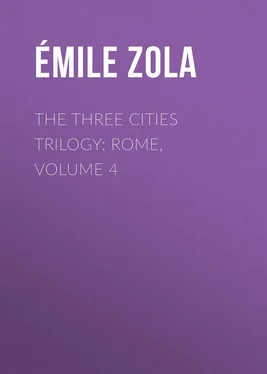Émile Zola - The Three Cities Trilogy - Rome, Volume 4
Здесь есть возможность читать онлайн «Émile Zola - The Three Cities Trilogy - Rome, Volume 4» — ознакомительный отрывок электронной книги совершенно бесплатно, а после прочтения отрывка купить полную версию. В некоторых случаях можно слушать аудио, скачать через торрент в формате fb2 и присутствует краткое содержание. Жанр: literature_19, foreign_antique, foreign_prose, на английском языке. Описание произведения, (предисловие) а так же отзывы посетителей доступны на портале библиотеки ЛибКат.
- Название:The Three Cities Trilogy: Rome, Volume 4
- Автор:
- Жанр:
- Год:неизвестен
- ISBN:нет данных
- Рейтинг книги:3 / 5. Голосов: 1
-
Избранное:Добавить в избранное
- Отзывы:
-
Ваша оценка:
- 60
- 1
- 2
- 3
- 4
- 5
The Three Cities Trilogy: Rome, Volume 4: краткое содержание, описание и аннотация
Предлагаем к чтению аннотацию, описание, краткое содержание или предисловие (зависит от того, что написал сам автор книги «The Three Cities Trilogy: Rome, Volume 4»). Если вы не нашли необходимую информацию о книге — напишите в комментариях, мы постараемся отыскать её.
The Three Cities Trilogy: Rome, Volume 4 — читать онлайн ознакомительный отрывок
Ниже представлен текст книги, разбитый по страницам. Система сохранения места последней прочитанной страницы, позволяет с удобством читать онлайн бесплатно книгу «The Three Cities Trilogy: Rome, Volume 4», без необходимости каждый раз заново искать на чём Вы остановились. Поставьте закладку, и сможете в любой момент перейти на страницу, на которой закончили чтение.
Интервал:
Закладка:
Increasing discomfort was taking possession of Pierre, who, seeking to relieve himself by a jest, exclaimed: "Come, come, at any rate it wasn't the Jesuits who gave you the fever."
"Yes, yes, it was!" Don Vigilio violently declared. "I caught it on the bank of the Tiber one evening, when I went to weep there in my grief at having been driven from the little church where I officiated."
Pierre, hitherto, had never believed in the terrible legend of the Jesuits. He belonged to a generation which laughed at the idea of wehr-wolves, and considered the /bourgeois/ fear of the famous black men, who hid themselves in walls and terrorised families, to be a trifle ridiculous. To him all such things seemed to be nursery tales, exaggerated by religious and political passion. And so it was with amazement that he examined Don Vigilio, suddenly fearing that he might have to deal with a maniac.
Nevertheless he could not help recalling the extraordinary story of the Jesuits. If St. Francis of Assisi and St. Dominic are the very soul and spirit of the middle ages, its masters and teachers, the former a living expression of all the ardent, charitable faith of the humble, and the other defending dogma and fixing doctrines for the intelligent and the powerful, on the other hand Ignatius de Loyola appeared on the threshold of modern times to save the tottering heritage by accommodating religion to the new developments of society, thereby ensuring it the empire of the world which was about to appear.
At the advent of the modern era it seemed as if the Deity were to be vanquished in the uncompromising struggle with sin, for it was certain that the old determination to suppress Nature, to kill the man within man, with his appetites, passions, heart, and blood, could only result in a disastrous defeat, in which, indeed, the Church found herself on the very eve of sinking; and it was the Jesuits who came to extricate her from this peril and reinvigorate her by deciding that it was she who now ought to go to the world, since the world seemed unwilling to go any longer to her. All lay in that; you find the Jesuits declaring that one can enter into arrangements with heaven; they bend and adjust themselves to the customs, prejudices, and even vices of the times; they smile, all condescension, cast rigourism aside, and practice the diplomacy of amiability, ever ready to turn the most awful abominations "to the greater glory of God." That is their motto, their battle-cry, and thence springs the moral principle which many regard as their crime: that all means are good to attain one's end, especially when that end is the furtherance of the Deity's interests as represented by those of the Church. And what overwhelming success attends the efforts of the Jesuits! they swarm and before long cover the earth, on all sides becoming uncontested masters. They shrive kings, they acquire immense wealth, they display such victorious power of invasion that, however humbly they may set foot in any country, they soon wholly possess it: souls, bodies, power, and fortune alike falling to them. And they are particularly zealous in founding schools, they show themselves to be incomparable moulders of the human brain, well understanding that power always belongs to the morrow, to the generations which are growing up and whose master one must be if one desire to reign eternally. So great is their power, based on the necessity of compromise with sin, that, on the morrow of the Council of Trent, they transform the very spirit of Catholicism, penetrate it, identify it with themselves and become the indispensable soldiers of the papacy which lives by them and for them. And from that moment Rome is theirs, Rome where their general so long commands, whence so long go forth the directions for the obscure tactics which are blindly followed by their innumerable army, whose skilful organisation covers the globe as with an iron network hidden by the velvet of hands expert in dealing gently with poor suffering humanity. But, after all, the most prodigious feature is the stupefying vitality of the Jesuits who are incessantly tracked, condemned, executed, and yet still and ever erect. As soon as their power asserts itself, their unpopularity begins and gradually becomes universal. Hoots of execration arise around them, abominable accusations, scandalous law cases in which they appear as corruptors and felons. Pascal devotes them to public contempt, parliaments condemn their books to be burnt, universities denounce their system of morals and their teaching as poisonous. They foment such disturbances, such struggles in every kingdom, that organised persecution sets in, and they are soon driven from everywhere. During more than a century they become wanderers, expelled, then recalled, passing and repassing frontiers, leaving a country amidst cries of hatred to return to it as soon as quiet has been restored. Finally, for supreme disaster, they are suppressed by one pope, but another re-establishes them, and since then they have been virtually tolerated everywhere. And in the diplomatic self-effacement, the shade in which they have the prudence to sequester themselves, they are none the less triumphant, quietly confident of their victory like soldiers who have once and for ever subdued the earth.
Pierre was aware that, judging by mere appearances, the Jesuits were nowadays dispossessed of all influence in Rome. They no longer officiated at the Gesu, they no longer directed the Collegio Romano, where they formerly fashioned so many souls; and with no abode of their own, reduced to accept foreign hospitality, they had modestly sought a refuge at the Collegio Germanico, where there is a little chapel. There they taught and there they still confessed, but without the slightest bustle or display. Was one to believe, however, that this effacement was but masterly cunning, a feigned disappearance in order that they might really remain secret, all-powerful masters, the hidden hand which directs and guides everything? People certainly said that the proclamation of papal Infallibility had been their work, a weapon with which they had armed themselves whilst feigning to bestow it on the papacy, in readiness for the coming decisive task which their genius foresaw in the approaching social upheavals. And thus there might perhaps be some truth in what Don Vigilio, with a shiver of mystery, related about their occult sovereignty, a seizin, as it were, of the government of the Church, a royalty ignored but nevertheless complete.
As this idea occurred to Pierre, a dim connection between certain of his experiences arose in his mind and he all at once inquired: "Is Monsignor Nani a Jesuit, then?"
These words seemed to revive all Don Vigilio's anxious passion. He waved his trembling hand, and replied: "He? Oh, he's too clever, too skilful by far to have taken the robe. But he comes from that Collegio Romano where his generation grew up, and he there imbibed that Jesuit genius which adapted itself so well to his own. Whilst fully realising the danger of wearing an unpopular and embarrassing livery, and wishing to be free, he is none the less a Jesuit in his flesh, in his bones, in his very soul. He is evidently convinced that the Church can only triumph by utilising the passions of mankind, and withal he is very fond of the Church, very pious at bottom, a very good priest, serving God without weakness in gratitude for the absolute power which God gives to His ministers. And besides, he is so charming, incapable of any brutal action, full of the good breeding of his noble Venetian ancestors, and deeply versed in knowledge of the world, thanks to his experiences at the nunciatures of Paris, Vienna, and other places, without mentioning that he knows everything that goes on by reason of the delicate functions which he has discharged for ten years past as Assessor of the Holy Office. Yes, he is powerful, all-powerful, and in him you do not have the furtive Jesuit whose robe glides past amidst suspicion, but the head, the brain, the leader whom no uniform designates."
Читать дальшеИнтервал:
Закладка:
Похожие книги на «The Three Cities Trilogy: Rome, Volume 4»
Представляем Вашему вниманию похожие книги на «The Three Cities Trilogy: Rome, Volume 4» списком для выбора. Мы отобрали схожую по названию и смыслу литературу в надежде предоставить читателям больше вариантов отыскать новые, интересные, ещё непрочитанные произведения.
Обсуждение, отзывы о книге «The Three Cities Trilogy: Rome, Volume 4» и просто собственные мнения читателей. Оставьте ваши комментарии, напишите, что Вы думаете о произведении, его смысле или главных героях. Укажите что конкретно понравилось, а что нет, и почему Вы так считаете.












